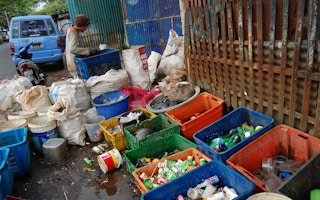One of the most effective ways to reduce plastic pollution is to use fewer new products in the first place, a United Nations analysis shows.
Manufacturers should offer reusable bags and bottles, and agree to wash or repair old goods to extend their lifespan. Such efforts can cut plastic pollution by 30 per cent by 2040, according to a report by the UN Environment Programme (UNEP), the global body’s environment office.
Recycling plastic waste can slash contamination by another 20 per cent, while the careful use of alternative materials will take care of a further 17 per cent of the problem, said the report, billed as a guide for governments and businesses.
Combined with proper disposal of the remaining waste, by 2040, the world could avoid up to 80 per cent of the harms of mismanaging plastic, including extra carbon emissions, exposure to toxins and ocean degradation, UNEP added.
About 430 million tonnes of plastics are produced each year, and is set to triple by 2060 as it stands. Much of the polymer produced goes into short-lived or single-use products, which contributes to junk that ends up in oceans, fertile soil, animals’ guts and even potable water supplies, representing a major risk to both humans and nature.
The report comes as global talks geared towards developing an international treaty for ending plastic pollution are underway. Countries worldwide agreed to work towards such a treaty last year and the second meeting of the Intergovernmental Negotiating Committee to develop the legally binding instrument will take place in Paris in two weeks.
Trillions in savings
The UNEP report crafts a scenario where mismanaged plastic waste falls to 41 million tonnes in 2040, against 227 million tonnes should no changes be made.
The amount of virgin plastics manufactured, mainly from fossil fuels, will shrink from nearly 385 million tonnes to about 150 million tonnes, as more mileage is squeezed out of existing material. The manufacture of single-use products, such as disposable cutlery, will be halved.
To reach this scenario, the world will need to get rid of “unnecessary and problematic” plastics, such as needlessly elaborate packaging, hazardous chemicals and substances that hinder recycling, UNEP said.
These steps, and the subsequent plastics reuse, recycling and replacement with new materials, can all be done with existing technology, but will require major policy action, it said. For instance, governments should write laws for take-back schemes, ban non-recyclables, mandate the use of recycled plastics, end fossil fuel subsidies, tax virgin polymers and study the credentials of alternative materials.
There may be “considerable” upfront costs, but overall savings is estimated at US$4.5 trillion, from a combination of lower spending on making polymers, higher revenue from recycled materials, and lower losses from avoided environmental ills.
UNEP said there could also be 700,000 more jobs by 2040, with losses in upstream and disposal sectors balanced by about 1.4 million new roles in the reuse industry.
Sheila Aggarwal-Khan, UNEP director of industry and economy division, said the report calls for system-wide changes.
“You cannot just solve one part of the problem. You cannot simply say, let’s just recycle our way out of the plastic pollution crisis. You cannot simply say, let’s just do away with single-use plastics,” said Aggarwal-Khan.
Petrochemical businesses have generally been resistant to the notion of slashing production of plastics, instead preferring a greater focus on waste management and recycling. The UNEP report said that tensions between stakeholders perceiving themselves to be “winning” or “losing” from the transition needs to be addressed.
UNEP executive director Inger Andersen said that the revenue from the plastic industry can still grow, should it embrace a “new and different way of working”, such as by introducing recycled materials into virgin plastic.
Even if plastic pollution is reduced by 80 per cent in 2040, there would still be about 100 million metric tonnes of remnants to deal with, some of which are already accumulating today, UNEP said.
Innovations like better car tyres and filters in washing machines are needed to reduce the unintentional scattering of microplastics. There also needs to be greater attention on lost or tossed fishing gear, its report said.
African nation Ghana had, in a previous global meeting, suggested a “legacy fund”, into which businesses dealing in plastics can contribute to, for removing plastics which have already entered the environment, especially in developing nations.
Plastic credit scepticism
While financing is needed to improve plastics management, the UNEP report says the use of plastic credits, where companies pay specialised businesses to coordinate waste collection, carries credibility and social risks today.
The lack of standard definitions and transparency means that it is difficult to assess projects, and could put informal waste collectors at the mercy of fluctuating prices for the material they gather. Funding via plastic credits could also be temporary, leading to income insecurity, and digital tools could alienate workers who do not have access to them, the report said
It added that learnings from the roughly similar carbon credits market should be leveraged to improve the plastic credit system.
Large consumer goods firms Coca-Cola and Unilever, which are among the world’s largest corporate users of plastic, have said they are not convinced on plastic credits, while there are industry players who believe naysayers might just be injecting uncertainty in the market.

















